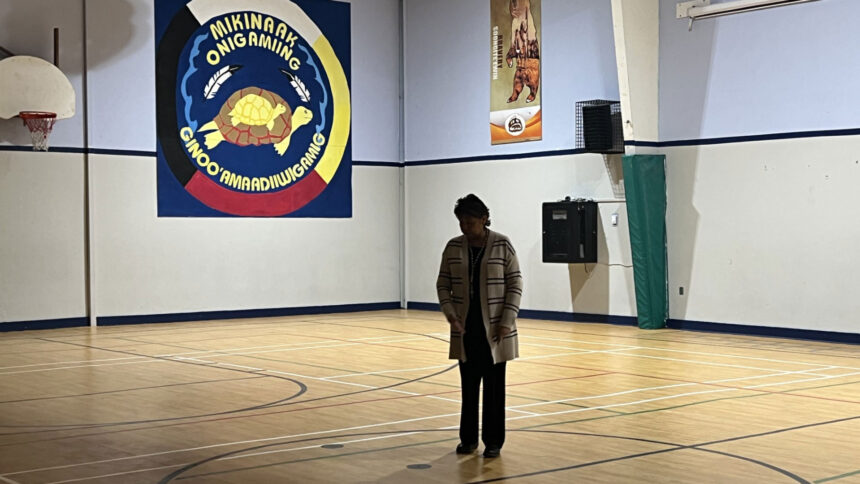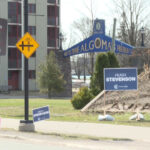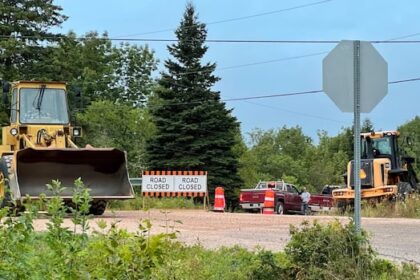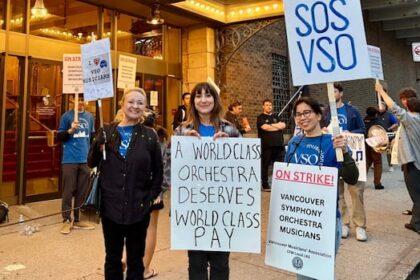The Ojibways of Onigaming don’t hold funerals in the school gymnasium anymore. It was the only place in the First Nation that had enough space to hold everyone. No one questioned it — until a student spoke up. “We have a lot of students that are in school right now who have lost a parent or two parents or lost a grandparent or lost somebody really close to them,” said Kathy Kishiqueb, Onigaming’s education director. “It’s over maybe a year now, where this chief and council have decided we would have no more funerals there. It was just too hard on the kids, too hard on the staff, kids and families. “It reminded them of all the losses.” Kishiqueb was chief in 2014 when four deaths by suicide prompted her council to declare a state of emergency that’s still in effect today. ”I would say almost every day we were dealing with either a suicide attempt or we were dealing with a youth that’s missing and presumed that they wanted to go and commit suicide,” said Kishiqueb. “It’s as if we’re on eggshells, what’s gonna happen next? Who is it gonna be? Because that’s how repetitive these deaths have happened – and my son was one of them. I lost my son. It’ll be two years this November.” Kishiqueb’s son, Robert “Greg” Kelly, 43, was among 43 on-reserve members who lost their lives to either suicide or illicit drug poisoning in the past three years – five per cent of the 900-person population. Jeffrey Copenace had just been elected chief in August 2021 when he was summoned to a situation where a member was at risk of taking their own life. Having limited experience in emergency response and never imagining this kind of expectation being in the chief’s job description when he ran, asked, “Why are you coming to me with this?” “Because there’s no one else,” was the response Copenace said. ‘I see a lot of First Nations left behind’ ‘It’s as if we’re on eggshells, what’s gonna happen next? Who is it gonna be?’ says Kathy Kishiqueb who lost her son. Photo: Karyn Pugliese/APTN. More than ten years after the state of emergency was declared, it’s not clear how Onigaming is faring. People here aren’t sure what the federal parties will do to help either. So far during this election campaign the Liberals and Conservatives, the two parties leading in the polls, have focused on resource extraction and developing new trade routes to remove Canada’s reliance on the U.S. and its tariffs and threats of annexation. Onigaming is an isolated community, the closest town being Nestor Falls where there’s a collection of houses, a few restaurants and motels that serve tourists, mostly during hunting and fishing seasons. It’s located along the winding Hwy 71, 120 kilometres southeast of Kenora in Treaty 3 territory in Ontario. Being rich in much sought after minerals, the area is a speculator’s dream and Onigaming sits next to a few potential gold mines. The junior mining firm Golden Rapture wants to redevelop eight historical sites with promising gold concentrations, while First Mining Gold has some rudimentary infrastructure built north of Onigaming. But Onigaming has declared a moratorium on mining – for now. When Copenace told Its president Richard Rivet that his community had declared a moratorium on mining in the territory, the junior miner responded in writing. “Hi Jeff, maybe your reserve is in such bad shape because you’re a terrible leader,” the letter said. On Tuesday, Grand Council Treaty #3 issued a statement that condemned Rivet’s comments as “disparaging,” adding the territory’s 28 member chiefs hold Ontario responsible as the “delegated authority for consultation.” The chiefs add that all proposed resource projects in the territory must pass through Treaty 3’s own resource law process, known as Manito Aki Inaakonigewin. ‘I’m seeing the gap between rich and poor become even greater when it comes to First Nations in this country,’ says Copenace. Photo: Karyn Pugliese/APTN. But Onigaming is struggling to implement a vision for its future where they find solutions in reviving their culture, which means going back to the land and not exploiting what’s beneath it. “Over the past ten years, I’ve seen when it comes to First Nations, the rich get richer. I’ve seen the most successful become more successful and good for them. Like I’m not going to be negative on First Nations that are achieving success, but I’m seeing a lot of First Nations being left behind and I’m seeing the gap between rich and poor become even greater when it comes to First Nations in this country,” Copenance said. Copenace said he listens to the young people in the community a lot. When he can, he takes them to AFN gatherings to join in on discussions and allow them to see how the political process works. He said one time he called in a group of youth and asked them what kinds of businesses they’d like to see in the community. They talked about a greenhouse, coffee shop and cannabis store. “All of this is possible,” he said. “When you talk about the economy when it comes to First Nations, it doesn’t have to be mining. And it doesn’t always have to be natural resource development.” Onigaming has dealt with mining companies before. Around the same time Kishiqueb declared the state of emergency in 2014, the community was drawn into a benefit agreement with Rainy River Resources — a company now known as New Gold that operates an open-pit gold mine 40 kilometres south. Kishiqueb said she never signed a deal. Instead, she told the province and other partners that Onigaming was in crisis and had no capacity to consent. She also felt unqualified to read the highly-technical impact reports they were sending. New Gold’s website lists Onigaming among Indigenous communities with whom it has signed Participation or Impact Benefit Agreements. “I felt like what they were doing was just trying to apply a lot of stress and pressure to get the project going,” Kishiqueb said. “Those assessments were already done, and it seemed like other First Nations had already been part of the process. I felt I was being led to believe that they already had approvals — that there was really nothing I could do to stop it.” Now there are new mining claims being filed to the north, which Onigaming leaders said could have environmental impacts on their spring water sources. That’s during an election where the two leading parties are pushing for faster development of energy projects to serve global markets and new trading partners as a defence against aggressive U.S. tariffs. (The province of Ontario also said it plans to introduce legislation to speed up natural resource projects in “special economic zones”) One of the signs on Onigaming territory. Photo: Karyn Pugliese/APTN. The Liberal Party platform, released April 19, promises to fast-track energy projects while working in “true partnership” with Indigenous Peoples. Prime Minister Mark Carney has also pledged to expand the First Nations Loan Guarantee Program, which helps Indigenous communities invest in energy infrastructure. Conservative leader Pierre Poilievre, polling close behind, has focused his campaign on extracting critical minerals and oil. He’s promised to build a national corridor to connect resources to international markets and to encourage First Nation participation by allowing companies to redirect a portion of their federal corporate taxes to local First Nations. But Onigaming isn’t interested. “There have been proposals for mines in places that are very sacred to us,” said Kelly. “And so it doesn’t matter the amount of dollars being waved in front of us — those are things we cannot do. It’s against our culture. We’re not just chasing a dollar so we can build a house or run a program for a certain amount of time. We cannot sell out our culture.” The only lawn signs in the community are NDP. Onigaming produces successful leaders Lena Copenace, the community’s crisis coordinator. She says calls for help is ‘usually always late at night.’ Photo: Karyn Pugliese/APTN. Those gathered at the health centre after hours chatting over Kentucky Fried Chicken carry the weight of Onigaming’s challenges – but describe it as a proud community. A year-old election sign on the roundhouse still proudly claims Wab Kinew, a member of the community who, in 2023, became the first Indigenous person elected as premier of Manitoba. Community members said they celebrated like they’d won the Stanley Cup. Onigaming has also produced the first female grand chief of Grand Council Treaty #3, Diane Kelly. Copenace was the first Indigenous advisor in the Prime Minister’s Office when he served under Paul Martin. Since then, he’s also served as an advisor to the federal Liberal Party during its 2015 campaign and before that, helped former Assembly of First Nations national chief Shawn Atleo get re-elected. Onigaming has also produced a professor teaching at Harvard. But in the past two years, not a single Onigaming student has graduated from high school. Kishiqueb said when COVID-19 hit in 2020, the community was already struggling and the isolation caused by the pandemic further discouraged students who tried to complete assignments from home. “Initially there was some interest in doing that then it all fell down. Students weren’t engaged in the work that had to be done. Parents weren’t engaged in that either. It just fell apart,” she said. Kishiqueb acknowledges the issues go deeper, and other long-standing problems in the community weigh upon students’ minds, impact their mental health and distract them. Solving mental health through cultural supports, programs cut The band office in Onigaming. The isolated community sits about 120 kilometres south of Kenora. Photo: Karyn Pugliese/APTN. No one can trace the crisis in Onigaming to a single cause. It’s layered, depending on who you ask. Some trace it back to residential school trauma, casting a shadow over even the youngest kids who never set foot in those buildings. One woman told us she took up drinking to self-medicate after being sexually abused. She said she’s not the only one. Others point to learned coping—watching parents drink to dull pain and repeating the pattern. Drugs are another issue. In 2022, Chief Copenace posted on Twitter that an ambulance from the Kenora district, refused to enter the community without a police escort. A First Nations man died, Copenace said. Kishiqueb said she never saw these types of issues growing up. She blames the growing accessibility of drugs and alcohol. Since 2014, Onigaming has implemented a range of programs to address the mental health crisis. Funding came in patches—from the First Nations and Inuit Health Branch and the province—to bring in outside support workers. But they didn’t always stay long. The band office became the unofficial crisis centre. Kishiqueb had a couch put in her office for youth who didn’t feel safe going home at night. Even there, the grief was close. Someone attempted suicide in the band office bathroom. When Lena Copenace, Jeffrey’s second cousin, arrived in the community as a crisis coordinator, she launched what’s now called the Makwa Patrol — an after-hours crisis response team. It began as a group of volunteers and grew into an 18-person team. Chief Copenace said the real problems, like addiction, hide in people’s homes. “If my dad was home, I’d take you to one house and you’d see at least two people passed out drunk on the floor,” said Copenace. Crises seem to surface at night, between 2 a.m. and 4 a.m. Elders in the community have asked leadership to keep caring for the cemetery. Photo: Karyn Pugliese/APTN. On the night APTN News arrived, an older man who had been drinking wandered off into the bush and got lost. People heard someone calling out—“Hey! Hey!”—and reported it. The temperature had dropped to minus six. The river had frozen again. “It’s usually always late at night,” said Lena Copenace. “We’ve gone up there a few times and found people. We bring them down.” Jordan’s Principle was the main source of money that supported many of the community’s programs—until this year. The initiative helped run activities that built cultural pride and community connection. It paid for beading, regalia-making, drumming, a fitness centre and sweat lodges. Most of the programs were held in the evenings with more than two dozen youth taking part. In the summer of 2024, the Jordan’s Principle team rented two houseboats and brought families to the old reserve at Crooked Foot—only accessible by water—to live on the land. “We had, I’d probably say, about 50 of us that camped out there. And then we had the Elders coming in every day,” said Lena. “It was just amazing, like seeing the kids, seeing the whole community come together, it was almost healing. “So I just feel like bringing everybody together. We’re trying to do healing ceremonies, cedar baths, everything. We’re just, anything that we can bring to our community is gonna help them.” But this year, Jordan’s Principle funding wasn’t renewed. Some staff positions were cut and the band is now covering the programs by drawing money from the interest from its trust funds. A lot of emphasis is being placed on culture and land-based learning, not only for mental health, but to keep kids engaged in school. To re-engage students, the oldest on-reserve school in Treaty #3, is now implementing more land-based learning. It teaches youth about sacred items, language, history and community customs. “Some of the educators have utilized going fishing, especially [with] the little ones… they learned how to count minnows. They learned who this fish is, if it’s a walleye or a different type of species,” said Kishiqueb. ”The kids seem to be so much happier. You could feel their energy like they’re so much happier. And it also has helped the educators of managing classroom behavior or behavior students.” All of it fits into a future the community sees that rebuilds a sustainable economy based on Anishinaabe values. “They wanted to sell plates of fried fish and all the whole works that come with it,” said Kishiqueb. “There’s an outside market for this. And blueberries. And so that’s what I see. And as well, we’re moving into growing our own vegetables.” Pressure to mine verses self-determination on the economy ‘The most urgent thing right now is helping the people get well and overcome the trauma that we’re all facing,’ says Diane Kelly, who manages the band’s trust funds. Photo: Jon Thompson/Ricochet Media. Since losing funding for Jordan’s Principle over the winter, Onigaming has had to make tough decisions. The programs it supported — after-school activities, land-based healing, cultural teaching — were more than just nice-to-haves. They were critical to the community’s recovery plan. Diane Kelly helps manage the band’s two trust funds. The funds emerged from recent legal settlements — $80 million for dams that flooded land and decimated wild rice on Lake of the Woods in the early 1900s and another $20 million for logging without proper consultation. That compensation for the imposition of resource development is now being used to replace withdrawn funding from Jordan’s Principle, a program the federal government created to compensate for inequitable health funding for Indigenous Peoples. “The most urgent thing right now is helping the people get well and overcome the trauma that we’re all facing,” said Kelly, “That has to be the number one priority and then everything flows from that. But at the same time, we’re still moving along with the other things.” Those “other things” are listed in the trust’s priorities — culture, language and heritage, health and wellness, education, infrastructure, housing, economic development, and employment. When it comes to economic development, Onigaming’s vision stands in stark contrast to what federal politicians are currently offering. Even as mining prospectors have sent imposing correspondence and called it consultation, Chief Copenence said he returned provincial funding designated to help the community participate in mining and map protected areas. “That seems to be the only answer Canadian governments have when it comes to economic development,” said Chief Copenace. “They don’t talk about culture. They don’t talk about language. They don’t talk about the aspects of us that make us so beautiful… our identity. “They always talk about the land that we live on. They always talk about the waters that we live on. And they always have these magnificent proposals. And the thing that really bothers me and that I struggle with is that there is no opportunity for First Nations to say ‘no.’ There is no saying ‘no’ at all in this country.” This story is co-published with Ricochet Media. Read their story here: Amidst a First Nations suicide crisis, federal leaders only see gold Continue Reading
Politicians debate a crisis of tariffs and trade, while in Onigaming the crisis is life and death

Leave a Comment










